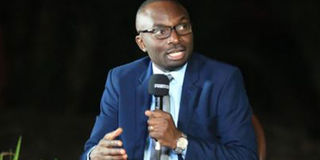What next for local sporting entities after the pandemic threatens viability model?

Author: Robert Madoi is a sports journalist and analyst. PHOTO/FILE/NMG.
What you need to know:
- The urgency to find a workable solution cannot be understated because things could implode if officials fail to show that they have considerably more zip.
President Museveni’s latest address on the pandemic left many Ugandan sports officials in a rather difficult situation. The said officials can be forgiven for coming across as someone who senses that they are losing, but aren’t quite sure to whom.
Before the address, perhaps not entirely coincidentally, Ugandan sports officials had grown noticeably frustrated that their respective disciplines had been kept on a tight leash since mid-March.
They seemed to have the incorrect impression that it would be business as usual if given the green light to resume sports activities.
Last Sunday, the green light duly arrived but with constrictions that are now indispensable to the fight against Covid-19. It consequently didn’t take long for the sports fraternity to learn that the crushing strain of the pandemic will continue to weigh ever so heavily.
What with frequent coronavirus tests that will cost hundreds of millions of shillings! There now appears to be a deep-seated sense of resignation that sporting disciplines will splutter and falter without ever kicking into top gear.
The pandemic has effectively threatened the viability model of Ugandan sporting entities. Most of them were heavily reliant on a golden goose that has now, well, ceased laying.
Physical distancing mandates have stymied revenue streams not least gate collections, which have always been quite handy. Rather than spell out the how, there is a burning need to interrogate the “what now?”
Unfortunately, the response from relevant stakeholders has been marked by its absence. This unwillingness to wake up to reality by breaking with passivity has laid bare age-old failures.
Instead of letting out wails about how unimaginably harrowing the new normal is, sports officials should take a hard look at instructive examples elsewhere. Sports bubbles have for the most part proved impervious to the pandemic.
If financial bottlenecks mean that these so-called bubbles are hard to replicate in this part of the world, what are the cheaper alternatives?
If the Ugandan sports landscape is an industry as its stakeholders claim, then it shouldn’t camouflage ineptitude in powerlessness. There should be a robust determination to ensure that Ugandan sport doesn’t continue to be a passive recipient of the pandemic’s bodyblows. Which it currently is.
The urgency to find a workable solution cannot be understated because things could implode if officials fail to show that they have considerably more zip.
Ugandan sport could, for instance, drift into the cross-hairs of match-fixing if coronavirus’s impact on the sub-sector continues to go unchecked.
Since nature abhors vacuum, expect sporting entities to attempt to supplant a viability model that has been threatened by the pandemic.
It is in the best interest of the sub-sector that the powers that be ensure that no crude experimentations are explored to make ends meet.
The pandemic has allowed and fostered the creation of cultures distinctly different from the old ways. It has also been relentless in targeting anyone and anything that doesn’t warm up to the new normal.
For sport, the new [ab]normal is an environment devoid of fans. With the return of spectators pegged on discovery of a vaccine, the immediate pain triggered by this remote way of going about things will admittedly be numbing.
We, of course, have to spare a thought for those in respective elite games who will be left tottering. But while we commiserate with them, the finger of blame will naturally shoot out.
We should learn how to incorporate worst-case scenarios in any outlook, sport inclusive. Above all, we should be flexible enough not to pin our hopes on one model.




